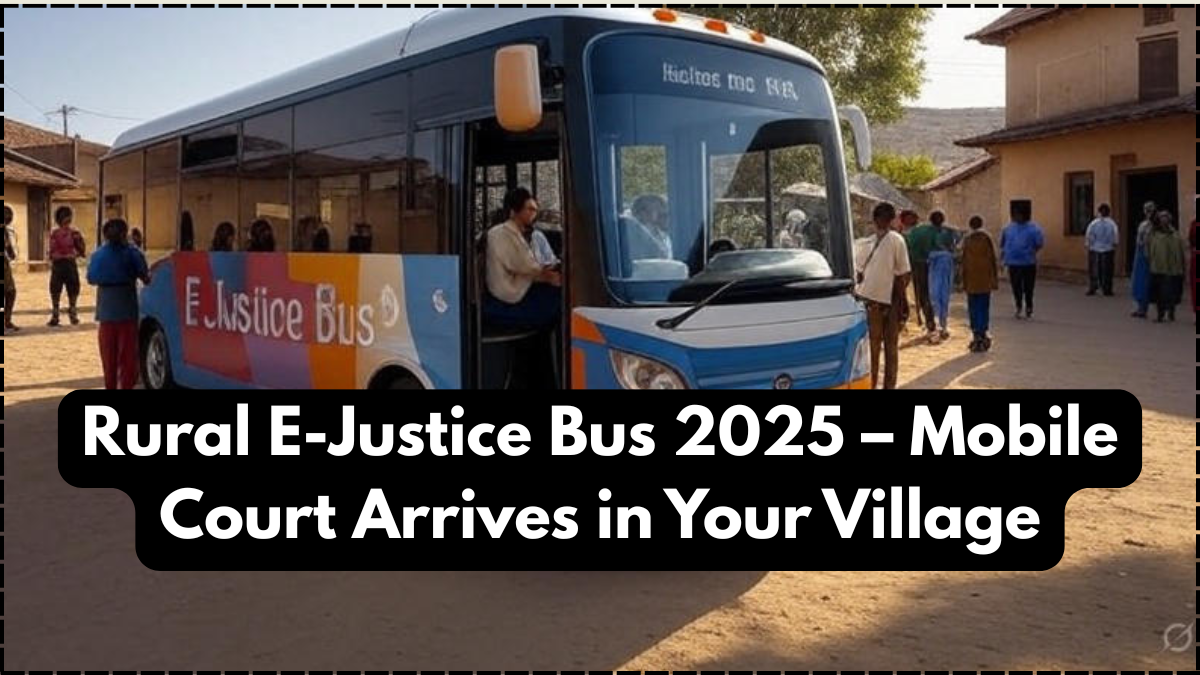Access to justice has always been a challenge in remote areas, but Rural E-Justice Bus 2025 is set to change that. This government-backed initiative brings legal services directly to villages, ensuring people no longer have to travel long distances to attend hearings, submit documents, or seek legal advice. Equipped with Mobile Legal Aid facilities, these buses function as fully operational mobile courts, making justice more accessible, affordable, and timely.
For rural citizens, this is more than convenience — it’s empowerment. The program reduces travel costs, speeds up case resolutions, and ensures that marginalized communities get fair representation. This aligns with the government’s larger vision of using technology and mobility to bridge service gaps in rural India.

Why Rural E-Justice Bus 2025 Is a Breakthrough
Many rural citizens face multiple barriers in accessing legal services — distance, cost, lack of awareness, and procedural complexities. Rural E-Justice Bus 2025 addresses these challenges by:
-
Providing on-the-spot Mobile Legal Aid consultations.
-
Allowing digital filing of legal documents and affidavits.
-
Hosting live hearings with judges through video conferencing.
-
Offering awareness workshops on legal rights.
This ensures that even the smallest villages are not left out of the justice system.
How the Mobile Court System Works
The Rural E-Justice Bus 2025 follows a structured approach to deliver effective services:
Step |
Activity |
Benefit |
|---|---|---|
1 |
Bus arrives at scheduled villages |
Predictable and reliable service |
2 |
Registration of cases and queries |
Immediate entry into legal system |
3 |
On-site hearings or video court sessions |
Saves travel time and expenses |
4 |
Provision of Mobile Legal Aid materials |
Improves awareness and self-representation |
5 |
Follow-up scheduling and case tracking |
Ensures continuity of service |
With internet connectivity, these buses link directly to district and high court systems, enabling real-time updates on case progress.
Social and Economic Benefits
The launch of Rural E-Justice Bus 2025 brings a host of benefits to rural communities:
-
Faster Case Resolutions – Minor disputes and document verifications are handled on-site.
-
Cost Savings – Reduces the need for expensive travel to district courts.
-
Empowerment Through Education – Mobile Legal Aid workshops help people understand their rights.
-
Inclusivity – Special provisions for women, senior citizens, and differently-abled individuals.
This system is especially valuable for farmers, small business owners, and daily wage workers who cannot afford to lose workdays for court visits.
Future Expansion and Integration
The government plans to expand Rural E-Justice Bus 2025 to cover all rural districts within the next three years. Additional features like AI-based legal query assistants, multi-language document translation, and integration with e-governance portals are on the roadmap. By strengthening Mobile Legal Aid, these buses will become a permanent part of rural justice delivery.
Conclusion
Rural E-Justice Bus 2025 is transforming the way legal services are delivered in rural India. By combining mobility with Mobile Legal Aid, the program ensures that justice is not a privilege for the few but a right accessible to all. This initiative is not just about convenience — it’s about making the legal system truly inclusive and responsive to the needs of every citizen.
FAQ
How often does the Rural E-Justice Bus 2025 visit a village?
The schedule varies, but most villages are visited at least once every month.
Can serious criminal cases be handled on the bus?
The bus primarily addresses minor disputes, documentation, and preliminary hearings, while serious cases are referred to higher courts.
Is the service free?
Yes, Mobile Legal Aid services provided by the bus are free for eligible rural residents.
How can villagers know the bus schedule?
Schedules are announced through panchayats, local notice boards, and SMS alerts.
Click here to learn more